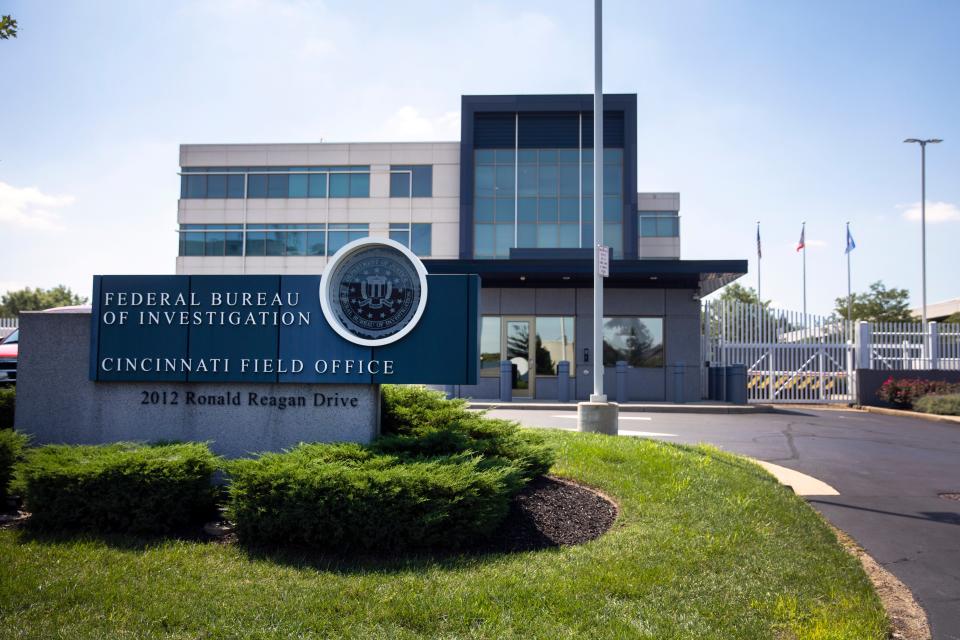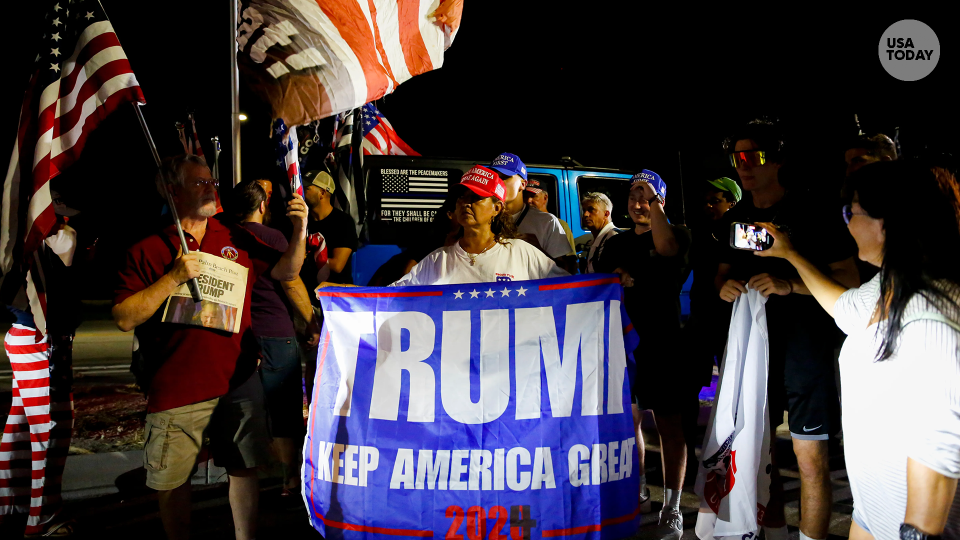Threats toward FBI, law enforcement were already on the rise. Then came Mar-a-Lago
In Ohio last week, a man attacked an FBI office with an AR-15 rifle and a nail gun before he was shot and killed in a police standoff. He had posted “Kill F.B.I on sight” on the social media site Truth Social.
In Pittsburgh, a man appeared in court Monday, charged with influencing, impeding or retaliating against federal law officers. "I am going to (expletive) slaughter you," he wrote on the extremist social media site Gab a few days ago, according to a federal complaint.
Over the weekend, a handful of armed protesters gathered outside the FBI office in downtown Phoenix, and another group staked out the FBI office in Midland, Texas. Meanwhile, the FBI and Department of Homeland Security issued a bulletin warning of heightened security risks against their agents.
Even before the FBI executed a search warrant on former President Donald Trump’s Mar-a-Lago property in Florida, Trump supporters on the far right, who had spent a year after the Jan. 6 insurrection quietly stewing, began ramping up threats.
“It’s crazy,” FBI chief Christopher Wray told the Senate Judiciary Committee this month, describing an array of domestic grievances that have turned violent, including attacks on law enforcement.
For subscribers: 'Kill FBI on sight': Truth Social reveals the final days of the Cincinnati attacker
But since Trump announced last week that the FBI had raided his home, across the internet, researchers and experts on extremism have seen a significant spike in violent and hateful rhetoric directed at the federal government in general and the FBI specifically.
Online and in real life, animosity toward the feds is at a level not seen in decades, several experts told USA TODAY. Given the almost limitless reach of internet pundits, whose message can connect with even one lone person prone to violence, they worry that the possibility of attacks will only increase.
“We haven’t seen this level of real mobilization to potential violence since the mid-90s,” said Javed Ali, associate professor of practice at the Gerald R. Ford School of Public Policy at the University of Michigan and a former senior counterterrorism official at DHS. “This is really disturbing, and I know firsthand from my colleagues back at the FBI that they’re taking this as seriously as they should be. It’s very upsetting to them.”
More: Trump calls DOJ probe a 'hoax'; experts, citing the Espionage Act, have a grimmer assessment
More: What makes information 'classified'? Who has the power to declassify it? Answers here.
Echoes of the 1990s
The early- to mid-1990s saw violence and angry rhetoric directed at the federal government after two tragic events: the botched raid of the Branch Davidian compound in Waco, Texas, and a standoff and shooting between federal agents and the Weaver family at Ruby Ridge in Idaho.
These two events, which still inspire domestic extremists today, helped fuel an anti-government movement that culminated in the bombing of the Alfred P. Murrah Federal Building in Oklahoma City on April 19, 1995 – the most deadly domestic terrorism attack in American history.

The Mar-a-Lago search, and the corresponding investigation of Trump, is being viewed as a similar overreach or abuse by the federal government by supporters of the former president, said Carla Hill, director of investigative research at the Anti Defamation League’s Center on Extremism.
“It's clear that some view the warrant at Mar-a-Lago as a call to arms,” Hill said.
Hill, whose team monitors extremist activity on the internet and elsewhere, said anti-law-enforcement rhetoric increased dramatically during the COVID-19 pandemic, especially during lockdown periods.
A movement that used to be largely pro-law enforcement has gradually turned against all forms of authority but saves its worst vitriol for the federal government, Hill said.
Fueling this shift are conspiracy theories spread on social media and by conservative media pundits on Fox News and elsewhere that reach audiences in the millions. Hill said that what concerns her most about today's climate is how ideas once considered extreme and fringe have been readily embraced by large swaths of the country.
“When you have mainstream people kind of feeding that rhetoric, the extremists really focus on that and see it as validation, and I think that's dangerous,” Hill said. “The mainstreaming of that sort of rhetoric, even though it's not as explicit, it turns explicit online. As we saw in the attack on Cincinnati, not all that rhetoric is hollow in nature – they mean it.”
More: The extremist watchers: How a network of researchers is searching for the next hate-fueled attack
More: What is extremism? Does it include far-left? Far-right? Choosing a definition is fraught.

A threat that never went away
The animosity toward the FBI and the federal government from the far right is nothing new; it’s just a reversion to the mean, said Michael German, a former FBI special agent and a fellow with the Brennan Center for Justice’s Liberty and National Security Program.
Before Trump was elected in 2016, most domestic extremists were virulently anti-government, German said. Throughout the Trump presidency, there existed an uneasy relationship between the far right and the president, whom many domestic extremists saw as being largely on their side in the broader culture wars, he said.
Some on the far right also saw Trump’s vilification of anti-fascist activists and Black Lives Matter protesters as further endorsement and protection from Trump and federal law enforcement, German said.

“They were primed to enjoy a halo of protection as long as they were targeting enemies that Trump designated,” he said. “For many of these people, they feel that they're actually authorized to engage in this violence, and they're conditioned to believe it, because they engaged in it in public, in front of police officers.”
Jan. 6, and Trump’s loss in the election, changed how extremists view their relationship with law enforcement.
Investigations of violent domestic extremists have more than doubled since the spring of 2020, Wray told the Senate Judiciary Committee on Aug. 4. Meanwhile, Trump supporters on the far right have cried foul, claiming they’re being unfairly targeted by a politically motivated deep state.
To extremists, German said, the Mar-a-Lago search looks like evidence that federal law enforcement has turned its focus not just on them but also on their leader, German said.
“They're looking at a world where, if Trump isn't put back in power, they're going to be criminals. and if Trump is put back in power, they're going to be the heroes who saved the day,” he said.
More: Read the FBI's search warrant for Donald Trump's Mar-a-Lago property
Hindering law enforcement
Ali said one of the most troubling things about the growing threat to the FBI is that it puts a crucial investigative agency on the defensive, hindering its work.
“This is completely outrageous, and it hurts national security,” said Ali, who also spent 11 years as the FBI’s senior intelligence officer for counterterrorism under presidents Barack Obama and Trump. “If the FBI now has to go into a defensive posture to protect its own staff and employees, how can it execute its mission to keep us all safe?”
Ali said it is important for federal agencies to be held accountable when they overstep their authority, but he said the Mar-a-Lago search appears to have been planned and executed carefully and lawfully.
That everyone from conservative members of Congress to Fox News personalities to extremists on social media is spreading conspiracy theories about the search shows how divided the country is and how dangerous that rhetoric can become, he said.
“It's deplorable, and it should stop, and cooler heads need to prevail,” Ali said. “My hope is that the people who have made those statements realize the consequences of what they're doing, but God forbid, if FBI personnel are attacked, or killed, or badly hurt, you could lay the blame at some of these folks, and they're going to have to look at themselves in the mirror.”
Contributing: Kevin Johnson, USA TODAY.
This article originally appeared on USA TODAY: After Mar-a-Lago search, law enforcement threats highest in decades

 money
money 